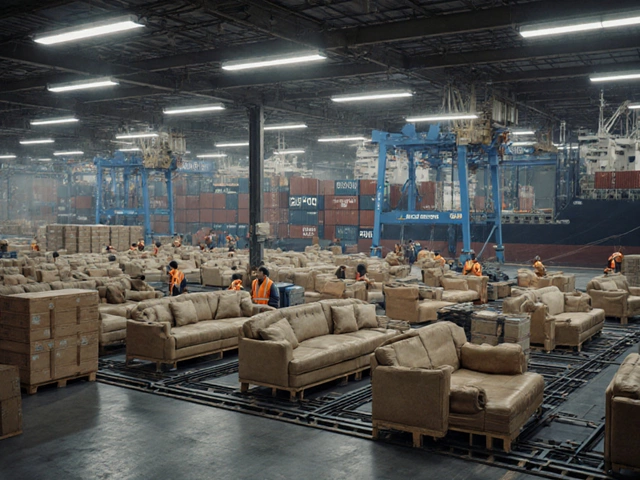Ever noticed how everyone seems to love homemade, crafted products these days? It's like mass-produced goods just don't have the charm anymore. Small-scale manufacturing, especially of artisan goods, is booming. People appreciate the uniqueness and the story behind each piece, whether it's a handcrafted candle or a tailored leather bag.
It's not just about the product being different; it's about feeling a connection to what you buy. Consumers want to support local talent and craft. It's become a trend to be proud of owning something that's not just 'off the shelf' but made with care.
- The Rise of Artisan Goods
- Why Custom Products Are In Demand
- Technology Meets Craft
- Tips for Starting Your Own Manufacturing Business
The Rise of Artisan Goods
In the past decade, there's been a noticeable shift towards artisan goods. Why the sudden interest? Well, part of it comes from our desire for uniqueness. We’re living in a world dominated by mass production, and people are craving something different—something with a personal touch and a story behind it.
This trend isn’t just a fleeting fashion. Reports show that the global market for handmade goods is expected to grow by 12% annually. Folks are willing to pay a premium for something that feels exclusive and thoughtfully crafted. Mass-produced items just can't compete with the charm and quality that come from small-scale manufacturing with personal attention.
Platforms like Etsy have played a huge role in this shift. They've given artisans a global stage to showcase their work. Suddenly, a guy making leather wallets in his garage can reach fans worldwide. That's a game changer! Plus, social media lets customers connect with brands on a personal level, which increases loyalty. Shoppers are more informed and empowered, making decisions that align with their values.
In a world where everyone is looking to make a smaller environmental footprint, supporting local businesses and small-scale manufacturers has become essential. It's more than just a purchase; it's a statement. People want to contribute to communities rather than corporations. Being part of this movement isn’t just exciting—it’s rewarding in so many ways.
Why Custom Products Are In Demand
So, what's the big deal with custom products, and why are they suddenly so popular? It’s all about personal touch and quality. People are fed up with products that are impersonal or lack character. When you buy something custom, you’re getting something that’s just for you. It’s not something found in every other household.
Customization lets consumers feel like they’re part of the creation process. Whether you're choosing the color of a pottery piece or having your name engraved on a product, it matters. This not only adds sentimental value but also uniqueness, making it a great conversation starter.
Then there's the quality aspect. Many small manufacturing businesses focus on using better materials and paying attention to details that large-scale manufacturers might overlook. Customers notice this dedication and are willing to pay a little more for it. Who wouldn’t want their handmade jewelry to not only look good but last long too?
Interestingly, a study done in 2024 found that small businesses offering personalized goods saw a 20% higher customer retention rate compared to their more generic counterparts. That’s some compelling stuff right there! It's a clear indication that once people experience the charm and quality of custom products, they're hooked.
Plus, the online world has made it super easy for these small businesses to reach a global audience without needing a giant marketing budget. Through social media and online marketplaces, artisans can showcase their unique crafts to potential buyers around the world, increasing demand even further.

Technology Meets Craft
These days, tech is shifting the game for small-scale manufacturing, making it more accessible and innovative than ever. You might think tech and handmade crafts don't mix, but they actually complement each other. In fact, new technologies like 3D printing and laser cutting are allowing artisans to create precise and intricate designs that were once impossible by hand.
3D printing, for instance, has revolutionized how creators develop prototypes. Need a model or a part? Just print it! This tech isn't only for tech geeks; it's becoming a staple for small businesses in the manufacturing sector as well. Imagine making custom jewelry, unique home decor, or even personalized gifts with the help of a 3D printer—each piece still has that handcrafted spirit, backed by high-tech precision.
Laser cutters are another must-have. They've made crafting faster and more detailed. Whether you're cutting through wood, metal, or acrylic, laser technology ensures each piece is cut with surgical accuracy. This efficiency is a boon for small businesses looking to produce quality products without upping costs.
Let's not forget digital design software like CAD (Computer-Aided Design). It's made translating creative concepts into real products a breeze. You sketch, you design, you print or cut. You get the control and flexibility to tweak every little detail until it's just right.
Curious about how it all comes together for a thriving small business? Here's a peek at the tech and craft dynamic:
- Efficiency: Reduced waste and quicker turnaround with precise cutting and printing.
- Customization: Create personalized and exclusive products with ease.
- Scalability: Start small and scale up as demand grows, without changing your entire setup.
The blending of technology with crafting isn't just leveling the playing field for small players, it's fundamentally transforming how they operate. By combining the craftsmanship of old with the power of new technology, small businesses in the manufacturing sector are finding fresh ways to thrive and stand out.
Tips for Starting Your Own Manufacturing Business
Got the itch to dive into small business manufacturing but unsure where to begin? You're not alone. Here are some practical steps to get your idea off the ground.
First things first, get clear about your product. What are you passionate about making, and what's the demand like? You want something you love and that's in demand. A good practice is to test your idea at local markets or online to gauge interest before going full throttle.
Next up, figure out your budget. Understand the costs involved with your product's manufacturing process. Create a simple budget plan that covers materials, labor, and production space. Don't forget about marketing expenses. They're crucial for getting your name out there.
Understanding how technology plays a role in your business can make all the difference. Whether it's using 3D printing or automation to cut costs or streamline processes, tech can be your best friend in small-scale manufacturing.
Have a network. Building connections with other small business owners can provide support and guidance. Join local entrepreneur groups or online communities. You'd be surprised how much people are willing to help each other out.
Finally, stay flexible. The market's always changing, and while predicting trends is tricky, staying informed and adapting quickly can set you apart from others trying to make a splash in small scale manufacturing.
And for the geeks who love numbers, consider this: A study showed that small-scale manufacturers who consistently followed these practices had a 30% higher survival rate in their first three years compared to those who didn't. Numbers don't lie!






